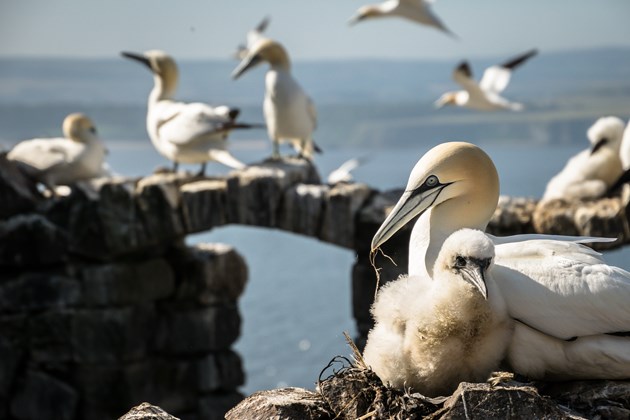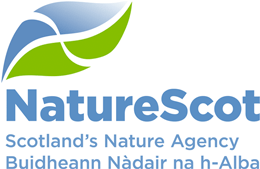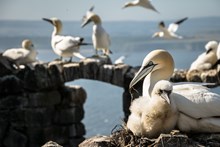14 July, 2022
Avian flu task force announced

NatureScot is setting up a new task force to co-ordinate a national response to the avian influenza crisis that is devastating vulnerable seabirds, and other wild bird populations in Scotland.
NatureScot will lead the new group which will come together this month and draw on experience from across government, conservation organisations, local authorities and the research community to drive forward a collective response to the crisis.
The task force will initially focus on sharing expertise and co-ordinating action to tackle the current outbreak of the H5N1 strain of avian flu.
Key priorities will include planning for an effective response to potential future outbreaks and variants, taking action to help protect and restore our bird populations and improve their resilience.
NatureScot chief executive Francesca Osowska said: “The avian flu crisis has been rapidly evolving and deteriorating. Tragically, this disease could be with us for some time to come, with early evidence confirming avian flu has moved into our urban gull and raptor populations, developments we and partners are monitoring closely.
“Responding to this crisis involves a national endeavour, and this task force will bring together partners who are already doing fantastic work, to better share expertise and co-ordinate action on the ground.
“In the long-term we know this is an international crisis which requires an international response. As we look ahead to the biodiversity COP15 in Montreal this December, protecting and restoring our biodiversity will have a key role to play in our response and resilience to viruses such as avian flu.
“Here in Scotland, the Scottish Government’s new Scottish Biodiversity Strategy, which is currently out for consultation, is responding to this challenge, setting out ambitious plans to halt biodiversity loss by 2030 and reverse it by 2045.”
NatureScot is also forming a sub-group of our Scientific Advisory Committee to provide further support on surveillance, monitoring and related research that is crucial to helping our wildlife’s resilience against future viruses.
Contact information
- Name
- NatureScot Media
- Telephone
- 0131 316 2655
- media@nature.scot
Notes to editors
- The latest confirmed figures of H5NI positive wild bird cases in Scotland released by DEFRA are 508 cases among 28 species over 139 locations. The main groups affected at this point are gannets, skuas, geese and gulls. NatureScot recognise that these figures are likely to be significant underestimates of cases as they only include dead birds that have been reported to DEFRA and that have been tested.
- Therefore, the public is urged to report all sightings of sick or dead bird to DEFRA on 03459 33 55 77 so that we can build a complete picture. Members of the public should avoid touching sick or dead wild birds. Visitors to coastal areas are encouraged to keep dogs on a lead to avoid them touching or picking up dead birds. More detailed information is available on the Scottish Government website.
- Earlier this month NatureScot made the decision to close two of our island National Nature Reserves, Noss and the Isle of May, to public landings in response to the avian influenza crisis. Decisions to restrict access are not taken lightly, but we are increasingly concerned about the devastating impact avian flu is having in Scotland. In particular we can give our seabird colonies the best possible chance of survival and recovery by reducing any additional stress and limiting the risk of the virus spreading through contact with visitor clothing and footwear.
- For other coastal locations owned by NatureScot, other organisations and land managers, we are asking the public to behave responsibly during this unprecedented outbreak and not to take access through seabird colonies for the rest of the breeding season. This approach gives the best chance to limit the spread of the H5NI virus by human activities and give colonies the best possible opportunity of survival and recovery by reducing any additional stress.
- For a limited number of small seabird islands this means stopping public landings until chicks have fledged. Visitors will still be able to enjoy the summer seabird spectacle by taking boat trips to seabird colonies without coming ashore, or by viewing seabirds from a safe distance without entering nesting areas.
- We have also issued advice to our National Nature Reserve staff, other managers of seabird colonies and British Trust for Ornithology (BTO) to suspend activities within colonies, and we are coordinating surveillance monitoring at key sites.
- Where suspension of licences impacts on the ability to prevent serious agricultural damage, NatureScot will work with affected parties to support alternative crop protection measures.
NatureScot is Scotland's nature agency. We work to enhance our natural environment in Scotland and inspire everyone to care more about it. Our priority is a nature-rich future for Scotland and an effective response to the climate emergency. For more information, visit our website at www.nature.scot or follow us on X at https://x.com/NatureScot
’S e NatureScot buidheann nàdair na h-Alba. Bidh sinn a’ neartachadh àrainneachd na h-Alba agus a’ brosnachadh dhaoine gu barrachd suim a chur ann an nàdar. Tha e mar phrìomhachas againn gum bi nàdar na h-Alba beairteach agus gun dèilig sinn gu h-èifeachdach le èiginn na gnàth-shìde. Tha an tuilleadh fiosrachaidh aig www.nature.scot no air X aig https://x.com/NatureScot

